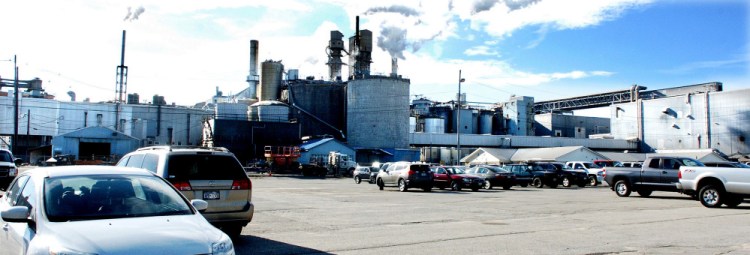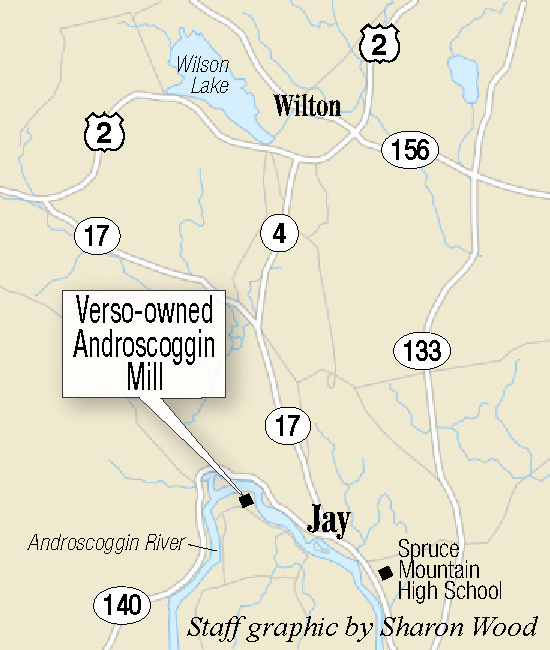Many of the 120 workers who are losing their jobs permanently at the Androscoggin mill in Jay already have started training for work in different industries or found employment elsewhere, an official with the Maine Department of Labor said Thursday.
The layoffs of nearly a quarter of the mill’s workforce — 120 workers — was announced Wednesday as a result of Verso Corp. permanently shutting down the No. 3 paper machine at the Jay mill.
It wasn’t a surprising outcome. Last November, Verso announced that the machine would be idled temporarily, requiring the layoffs of an estimated 190 workers, because of declining customer demand and “more coated paper capacity than could be filled.” The year before that, the company laid off 300 people at the mill, whose employees are not unionized.
Verso had said last fall that the layoffs associated with the temporary idling would become permanent if the company couldn’t find enough customers for the products made on the No. 3 machine. Although local officials had held out hope the company would restart the paper machine, many workers affected by the machine’s idling have spent the ensuing months searching for new work.
“Most of these workers have taken steps in case it was not a temporary layoff,” Julie Rabinowitz, the director of policy operations and communications for the Maine Department of Labor, said Thursday. “None of them were hanging out for Verso to make a decision.”
Rabinowitz said her agency was in contact with the workers when the temporary layoff was announced last fall. A rapid response team, which helps workers of companies looking at downsizing or closure, met with affected workers and said they qualified for re-training programs.
The shutdown announced this week is expected to be effective Aug. 1 and to be complete by the end of the third quarter of this year. It would reduce the mill’s annual coated paper production capacity by about 200,000 tons.
Sen. Thomas Saviello, R-Wilton, said Thursday that he and Senate President Michael Thibodeau, R-Winterport, called Verso officials last winter and asked for a meeting to see what they could do to help keep the machine running at the Jay mill. He said they called twice, but the meeting was not scheduled.
“They never met with us,” Saviello said.
Saviello said he had been hopeful that part of the mill would remain operational, but also said the population today has helped usher in “the demise of the coated paper industry.” Fewer people are getting catalogs and magazines, instead choosing to read and shop online. He said the fact that the industry lasted as long as it did was a testament to those who worked there.
“We’re part of that. The culture has changed so much,” he said. “We have changed the way we use it, which resulted in its downturn.”
Rabinowitz said the initial estimate was about 190 workers would be laid off, but that number probably was high to begin with and was closer to 150 by January. She said in layoff situations, the company often estimates toward a higher number to ensure the company doesn’t have to double back and inform even more workers of a potential layoff. Once layoffs were announced, Rabinowitz said other employees might have opted to leave on their own, which reduced further the number of those affected.
“We’d rather prepare people for the worst and hope for the best,” she said.
Of the 120 laid-off workers, 70 are in training programs for new careers and 20 have been re-hired for different jobs at the mill. Another 30 decided to accept a wage subsidy, which is available to workers who are at an older age, and it helps make up the difference of lost wages if that employee finds a new job with lower pay.
Any remaining balance of workers would be those who chose to retire or were able to find a job on their own or had a spouse or partner to help until they did retire, Rabinowitz said.
Rabinowitz said her agency had been working with the potentially affected employees for the last six months. Workers in training programs will go to schools such as Kennebec Valley Community College in Fairfield to learn new trades. She said employees have 30 days from the notice of the layoff to enter a training program, which is funded by grant money from the U.S. Department of Labor. Upon notice that a layoff at a company is coming, Rabinowitz said, the Maine Department of Labor petitions for provisions of the Trade Act Program, including new training, be provided. The Jay mill and its workers qualified.
Saviello said Thursday he was “extremely disappointed” to hear about the layoffs, and said his thoughts were with all those employees who lost their jobs. Saviello hoped many affected workers would take advantage of resources such as job training programs outlined by the Department of Labor, as many of those workers have skills they probably aren’t aware of. He said many could go back to school, start a business of their own, or just figure out what their other skill sets are.
For recent employees, Saviello said they had to go through a strict screening process, which tells him they have the ability to work elsewhere.
“I hope they can take advantage of that and realize there’s a life after papermaking,” Saviello said.
Saviello said he was not sure whether he knows anyone who lost a job from the layoffs. He advised anyone concerned to contact his office.
This latest round of layoffs will reduce the workforce to 400 employees. Of the employees informed of the layoffs in November, 120 have been on layoff status since January. They do not receive pay but continue to be eligible for Verso health insurance benefits. As of Aug. 1, those employees will lose their employer coverage and will be eligible for COBRA gap coverage. Employees who are losing their jobs because of the shutdown will receive severance pay, the company said.
Most of the products made on the No. 3 paper machine have since been transitioned to lower-cost machines at other Verso mills, the company said.
Five mills in Maine have closed in the last few years — including the Madison Paper mill this spring, putting more than 200 people out of work — and more than 2,300 workers have lost their jobs since 2011 as the industry reels from declining global demand for paper. Verso closed its Bucksport mill in 2014, which resulted in more than 500 lost jobs.
Colin Ellis — 861-9253
cellis@centralmaine.com
Twitter: @colinoellis
Send questions/comments to the editors.





Comments are no longer available on this story